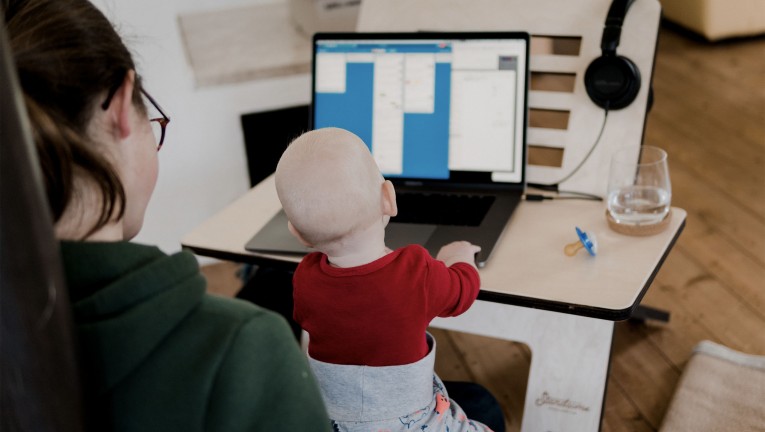9 tips for working from home

Home-working is not a new concept, but it tended to be the exception rather than the rule. The COVID-19 pandemic has changed all that, with the majority of workers now spending at least some of their time working from home.
Disabled charities and action groups have been campaigning for home-working options to become more mainstream for years, and there are calls for disabled workers to have more choice over where they work after the pandemic has subsided. In fact, a study has shown that the majority of workers in general would prefer to work from home going forward.
It may well transpire that the radical changes we've made in the last year will indeed become 'the new normal', so we should do whatever we can to optimise this way of working, and ensure employees have the support they need to do their jobs well.

What are the benefits?
For some, switching to home-working has been easy. It suits certain personality types better than others; for those who love having time to themselves to get loads of work done, this might be paradise. For those who rely on the presence of others for support, encouragement and mental stimulation, it's been more of a challenge.
For everyone, though, there are some benefits. For example, you probably have a lot more flexibility than you did before. You can choose when to start your working day, when to take a tea break, when to have lunch, and when to finish. As long as you log your hours and attend your meetings, you have a certain amount of freedom - and this can be hugely beneficial for you, and also your employer.
Another obvious benefit is the lack of a commute. Some of us have regained two or more hours of our lives per day. This means we're better rested, more productive, and less stressed. This has also saved us significant amounts of money.
As we're in control of our environment, we may feel more comfortable. We can control the ambient temperature and wear more comfortable clothes. We're at home, so we feel more at home, and the pressures of work may seem more distant.

What are the drawbacks?
It's harder to collaborate. Although there are lots of technological solutions out there to help with this - and we'll touch on some of these later - nothing can really simulate people physically coming together in a room to develop ideas and solutions.
Not everyone has a great home-working set-up. Only a few people are lucky enough to have a spare room, or even a dining room, that they can turn into an office. For many families, the home-working and home-schooling situation means they have a full house all day, so carving out a space to work is a huge challenge.
There are more distractions. Working from home, it's much easier to get knocked off course by external distractions such as the TV or radio being on, children needing your support, delivery people coming to the door and general domestic duties. Working from home requires more discipline and self-management.
For some, easy access to the kitchen leads to more snacking throughout the day, which can negatively affect our diet and weight. It takes will power to ignore the call of the fridge.
Without your colleagues around you, it can be hard to motivate yourself to get on with your work. On the other hand, for some people the opposite may be true, and they end up working too hard because they feel all the responsibility falls on them.
When you work at home, you lose the division between your work-day and your time off. Some people find it hard to switch off from work in the evening when their computer is sitting on the table in the next room. Others work much longer hours without the normal end-of-day cues that indicate it's time to down tools. The home maybe doesn't feel like a sanctuary from work anymore - it's just another office.
For those with children, working from home can be a huge struggle, especially while the schools are also closed. Holding down a full-time job whilst home-schooling your children (which is also a full-time job) is causing some parents to have to make a drastic choice between their career and their children's welfare.
How can we make it better?
While we can't promise that these tips will resolve all of the issues of home-working, we believe that little changes can make a big difference. If you're struggling with home-working, or simply want to optimise your performance, these tips might help.
Understand your needs and be kind to yourself
If you feel that working from home is negatively affecting your mental health, it's worth analysing why this is happening. Simply understanding why you're struggling can help pave the way for better coping mechanisms. Try taking an online Briggs Myers test - it may reveal things you didn't know about yourself. There is plenty of advice out there to help you mitigate the effects of working from home based on your personality type.
Of course, an online test can only do so much. If you're feeling really low, it's best to talk to someone. Mind have a lot of useful advice for finding a therapist, and share their own tips for looking after yourself while working from home.
Set up a work space
It's important to physically separate your work space from your home space as much as possible. Some of us are lucky enough to have summer houses and spacious spare rooms that can be converted into offices, but the rest of us need to get more creative.
Try using a room divider to split open-plan spaces into discrete units. These attractive dividers can be found on Amazon and are great for zoning off parts of your home to create work spaces.
Agree with your family or housemates that you shouldn't be disturbed (unless there's an emergency) when you're in your work space. A physical boundary - whether it's a closed door or just a line on the floor - can help to psychologically reinforce this rule.

Get the right equipment
In order to do your job at home as well as you did in the office, you need access to the right equipment.
The government is issuing £5,000 grants to businesses who need to upgrade their technology in order to help their employees work from home - so make sure your employer is aware of this and other funding opportunities.
In addition, you can claim tax relief to cover
the costs of working from home. This can help with expenses such as
broadband upgrades, heating and contents insurance.
Get better at video calls
Remember a time when video calls weren't an everyday occurrence? No, we can't either. It's likely that, even after the current crisis has subsided, video calls will continue to play a major part in our working lives.
We'd
probably all agree that video calling can be exhausting, but there are
ways to improve your experience - such as setting time limits for
meetings - and practical things you can do - such as investing in a
better mic - to help you come across better on-screen.
Establish your working hours - and stick to them
Working from home means we have more flexibility around our work hours, but it's been proven that sticking to a routine is beneficial for our mental health. If you can, try to start work at the same time every morning, take breaks at the same time, and finish at the same time. This scheduling will help you distinguish between work-time and off-time, and prevent those boundaries from blurring.
It also helps to manage the expectations of your family - if they know you'll finish working at 4.30 pm, they know that anything non-urgent can wait until then.
Reinforcing your schedule will help you to avoid burnout. It's vital to take regular breaks from work, no matter how busy you are. You should never feel pressured by your employer to work more than your contracted hours. Seek help from Citizens Advice if you feel that this is happening to you.
Working regular hours can also help to satisfy your employer that you're doing your job well. If you're consistently logging the same hours each day, it's easy for them to see you're putting the right amount of time in.
Get a separate phone number
You don't have access to the office phone, and you possibly don't even have a landline. So how do you talk to colleagues and clients on the phone? Don't use your personal mobile for work calls. This is crucial - people from work shouldn't be able to access you during your personal time.
One option is to ask your employer to provide a company mobile for you to use for work calls - but this can be expensive. There are several cost-effective alternatives that work just as well, such as Google Voice or Skype.

Separate your work life from your home life
As part of your routine, include short activities to teach your brain that your work day is over. Try this: straight after you log off for the day, go out your front door, close it, take a deep breath, and then go back inside. Just mimicking the process of coming home after a day at the office can help you to make a psychological distinction between 'on-time' and 'off-time'.
Shut your computer down completely when your day is over. It's easy to pop back online to finish that report or check your emails if your machine is left on. If it's off, you're much less likely to dip back into work. It's better for the environment too!
If you've got papers lying around that might tempt you, put them away in a folder, on a shelf or in a drawer. Out of sight, out of mind.
Turn off your email alerts, if you get them, on your phone. Your work life shouldn't be intruding on your down-time.
Make plans to do fun things in the evening to take your mind off work. Try an online escape room experience with your friends or baking with the kids.
Encourage your employer to run, or invest in, online training courses
Working from home means you might not have access to training courses and career advancement opportunities. But there are plenty of online resources available that can make continual professional improvement possible.
There are tons of courses in all sorts of industries available online - many at discounted prices.
Stay in touch with your team
When working from home you can easily start to feel isolated, which can lead you to feel solely responsible for your work. In the old days, working in close proximity with our teammates made it easier to ask for support and spread the load. That's why it's vital to stay in touch with your team when you're not able to be physically together.
There are a number of online conferencing software options that you're probably already familiar with - so we won't talk about those.
Instead, here are some other useful tools to help you stay connected.
- Google Jamboard. This is an interactive whiteboard-style interface that's perfect for team collaboration. It's free to use and works on any device that has an internet connection. Create sticky notes, annotate drawings and collate ideas.
- Trello. This project management tool is based on Kanban - the Japanese principle of workflow. Trello boards allow you to plan and progress projects collaboratively, making communication and delegation easy. There's a free version with lots of functionality.
Try out some virtual team building experiences. There are loads out there, or you could keep it simple with a weekly pub quiz.

Share your experiences with us
We'd love to hear how you're coping with working from home. Whether you want to share a hilarious video meeting catastrophe or you just need to vent, we want to hear from you. Get in touch on social media, leave a comment below, or contact us via our website.
We hope you've found these tips useful, and if you have some tips of your own, please do send them in. Let's face it, we need all the help we can get!
Thanks for reading. Don't forget to like, share and subscribe to our Connected newsletter.


Comments